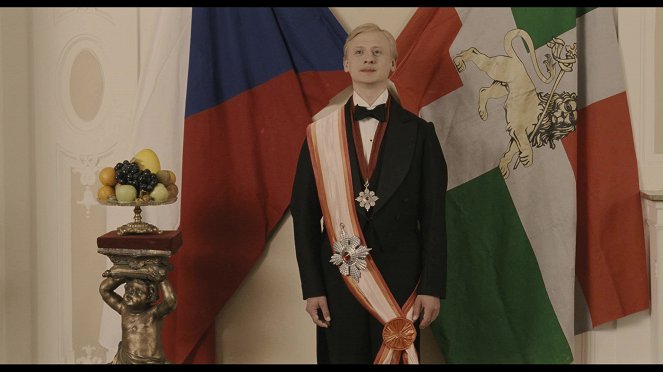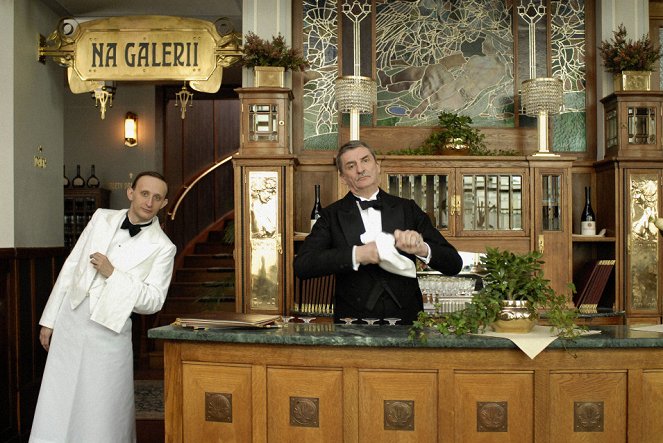Director:
Jiří MenzelGuión:
Jiří MenzelCámara:
Jaromír ŠofrMúsica:
Aleš BřezinaReparto:
Ivan Barnev, Oldřich Kaiser, Julia Jentsch, Zuzana Fialová, Milan Lasica, Marian Labuda, Martin Huba, Josef Abrhám, Jiří Lábus, Jaromír Dulava, István Szabó (más)Sinopsis(1)
Jan Díte es un joven camarero provinciano que quiere convertirse en millonario. Y sabe exactamente cómo conseguirlo: escuchándolo todo, observándolo todo, y utilizando todo lo que ha escuchado y observado. Con esa convicción y un deseo irrefrenable de complacer a todo el mundo, pronto abandona su primer empleo, en un pub, por un burdel de lujo y, finalmente, por un elegante restaurante Art Nouveau de Praga. Pero ahora ha llegado el final de la década de 1930, y las cosas están cambiando: Hitler ha ocupado Sudetenland y está dividiendo Checoslovaquia. Jan se enamora de Lisa, una alemana de los Sudetes orgullosa de su sangre aria. Se casan y, cuando Lisa regresa del frente, lo hace con una fortuna en sellos singulares que los judíos "dejaron atrás". Jan vende los sellos y se convierte en millonario. Sin embargo, sólo puede disfrutar de su fortuna durante tres años: el nuevo régimen comunista lo encarcela durante 15 años, uno por cada uno de sus millones... A su salida de la cárcel, Jan es enviado a vivir a una decrépita ciudad fronteriza que fue abandonada por los alemanes. Allí dispone finalmente de tiempo para pensar sobre los acontecimientos que conformaron su vida, y para reflexionar sobre lo que podría haber pasado si él hubiera desempeñado un papel distinto en dichos acontecimientos. (Wanda Visión)
(más)Videos (4)
Reseñas (6)
Menzel returned behind the camera to show another face of humanity. However, he forgot that in his previous ventures, it worked because of honesty, not because the naive hero with a silly smile pushes through a world of falsehood – only to eventually joyfully indulge in it. The director's pleasure in adapting clearly defined characters, which worked so perfectly in Cutting It Short, tragically fails when The King starts to become an attempt at something more. It inevitably sounds completely foolish. Czechs are either cowards or hurt patriots, Germans live only for their devotion to Hitler, and when the Victorious February arrives, the smiling communists must not be missing, as they want to divide everything among the people. What could be more half-hearted than these characters? In such moments, the last smile disappears from the face, which stemmed from the fact that if I don't get a proper story, at least the thread is adorned with many attempts at "nice scenes from life". Unfortunately, there are too many passages where absolutely nothing happens and a group of cheerful, chubby gentlemen eagerly looks at a half-naked girl. So much so that Menzel's planned career peak becomes occasionally torture and proof that anyone can end up at the bottom of Czech film quality.
()
The great return of the great Menzel. Jiří hasn't done much in the last 20 years, but when he has, it's been worth a look. Personally, I adore The End of Old Times and The Beggar's Opera, so I have no problem accepting I Served the King of England into this rank. He attracted well-deserved attention and reminded people in a poetic spirit that the period during Second World War was not black and white. For that alone, he deserves my thanks. This is because all the other essential ingredients like the setting and overall period believability were fulfilled to the max. Of the actors, I would particularly single out Huba and Dulava.
()
The long hiatus certainly did not benefit Jiří Menzel, as all the feelings of a true artist drained out of him during that time. The only thing that remains is the skillful craft (he and cinematographer Jaromír Šofr create true wonders), which, however, desperately lacks energy in the form of authorial input and real emotions. The less than two hours are arranged in a self-effacing coat, through which Menzel wants to evoke a classic retro atmosphere and at the same time innovate a bit and get closer to the current trends (the terrible special effects in the form of flying stamps and money). Unfortunately, the result is disproportionate kitsch (although in several cases intentional). There was not much room for comedy n the tragicomic plot, and Menzel resigned himself to tragedy completely (except for the character of the chief Skřivánek in a phenomenal performance by Martin Huba). Ivan Barnev, in the lead role, fills in the concept of "commis waiter" to the last detail, while the philosophizing Oldřich Kaiser goes a bit outside the plot, despite the fact that he is its narrator. The rest of the cast simply floats through the story (except for the aforementioned Martin Huba), leaving us with nothing worth remembering, which is essentially how the entire film comes off. It’s a dry average that definitely doesn't show how much of a dream project it is.
()
I would understand and accept the fact that Jiří Menzel in his current form is not good enough for Hrabal's original. But only if I Served the King of England was a poetic, funny and cohesive film. But it is not. The cohesive narrative subject of Hrabal's novel was replaced by the miserable Barnev and the vain-saving Kaiser, leaving a tendentious and convulsive band of grotesque scenes from the wild gush of colorful stories, which Menzel cuts without interest, idea and poetics. The film runs idle most of the time and only Martin Huba, Milan Lasica, a few nice moments with Oldřich Kaiser and the introduction woke me from my lethargy. A film pulp was created from the excellent book stories, which combines ungainly shallowness, melancholy and political correctness. He changes the book template decently, but rarely for the benefit of the cause. As a person unfamiliar with the book, from the film version I would probably feel a confusing emptiness, but as a person who admires the original, there is almost pain in my soul. Unfortunately, Menzel is just getting old; the 80's are gone. It’s too bad that his retirement affected one of the best texts by Bohumil Hrabal.
()
Jiří Menzel has made an artistic kitsch, in every sense, including the negative one. He allows the camera to capture long shots that don't say anything at first glance, and often don't say much even upon closer inspection. He does things his own way, doesn't let himself be stopped, and maintains a laborious poetic style, where in the film, there's essentially nothing that stands out above the rest, even though it could. In my opinion, it is precisely this poetic style that kills many truly powerful scenes.
()



Anuncio